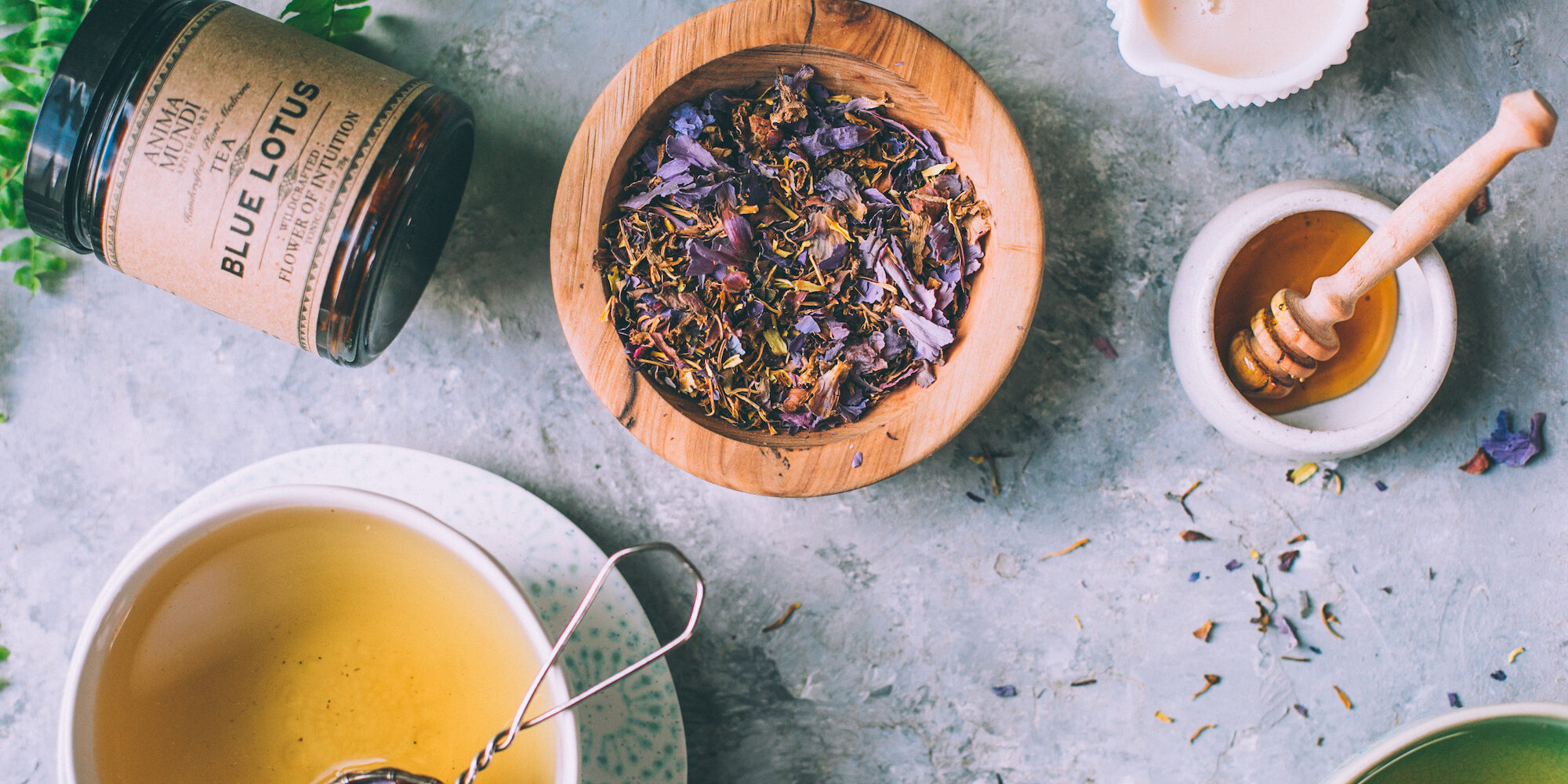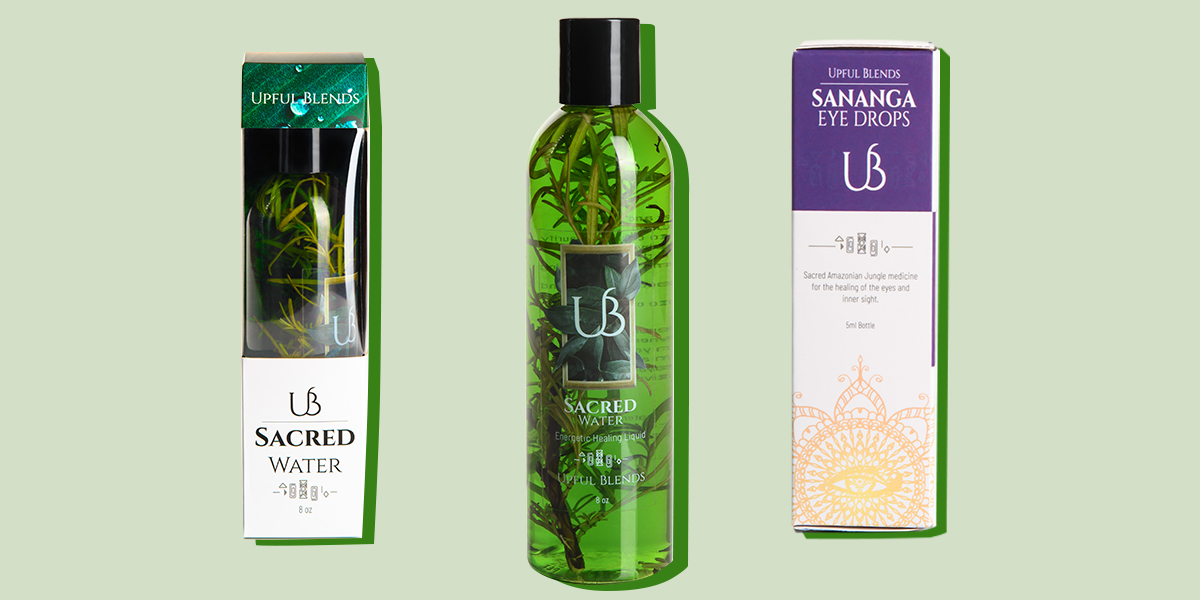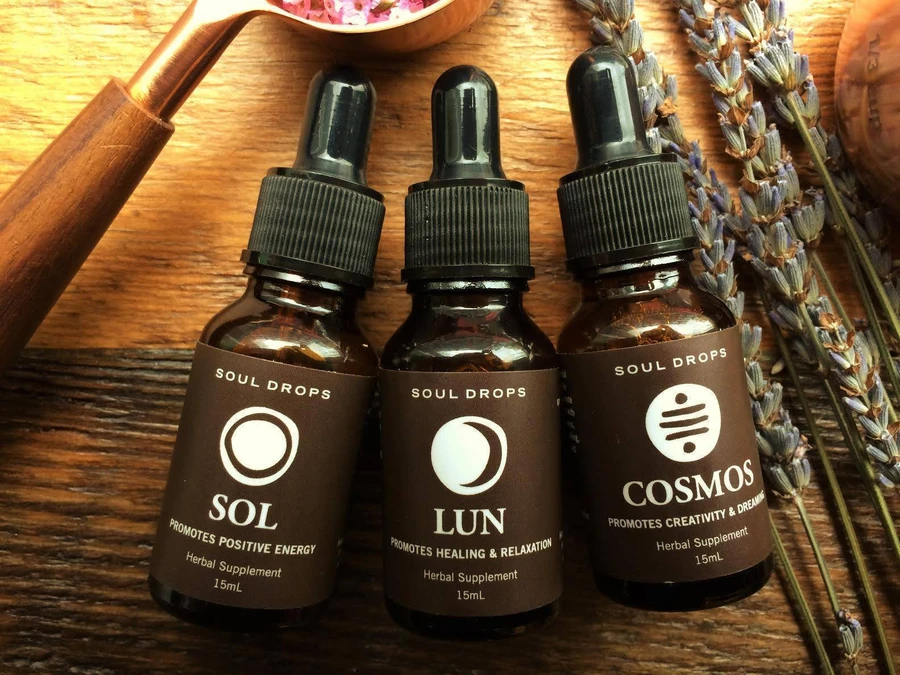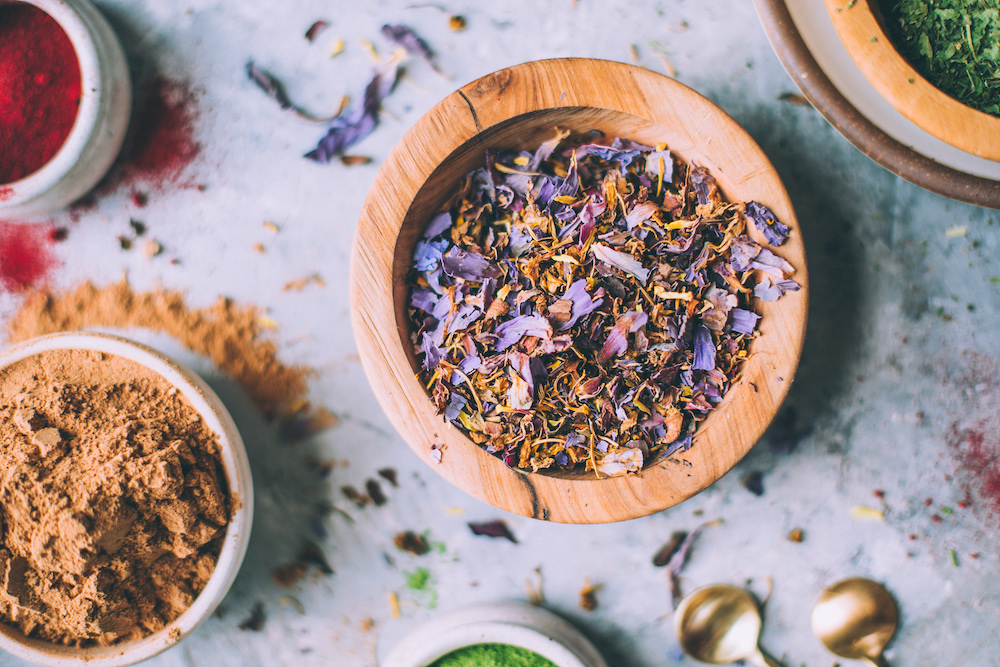
The Nascent Wellness Category Of Psychedelic-Adjacent Products
While psychedelics are increasingly moving into the mainstream, psilocybin, LSD, ketamine and other mind-altering substances are still widely prohibited by law and, legal or not, for many people, the stigma associated with drug use keeps them away. Before those barriers to broad adoption are removed, wellness brands are offering legal alternatives to psychedelics for consumers looking for the physical, mental and even spiritual benefits of them.
The brands are whipping up teas, tinctures, topicals and even eye drops containing a myriad of plant ingredients, including some that have been used by Indigenous cultures in conjunction with psychedelics to cleanse auras, decalcify the pineal gland, release negative emotions, promote lucid dreaming and more. Examples of the ingredients are mucuna pruriens, a legume that contains a form of DMT, the hallucinogenic compound in ayahuasca; boa vine, part of the ayahuasca plant that doesn’t have DMT; and sananga, which is made from the roots and bark of the South American shrub tabernaemontana undulata and is a traditional medicine of the Yawanawá tribe in the Amazon. Sananga extract is administered in eye drops and plays a role in ayahuasca ceremonies.
The psychedelic-adjacent products are entering the wellness sphere as pandemic-exacerbated exhaustion and anxiety have become constants. Adriana Ayales, an herbalist and founder of the wellness brand Anima Mundi, believes the stressors of modem life, particularly in the past year and a half, have driven people to seek these progressive products. “It’s so fascinating to see the rise of spirituality and healing through all these plant medicines,” she says. “It makes me hopeful that people are becoming conscious to something else other than what’s been running the show—and not too well—for a long time.”
Data platform Trendalytics had detected the volume of searches for “boa vine,” although relatively low, is up 73% from last year. The wellness company Soul Drops has boa vine in its product Lun, an oral tincture designed for daily use. Soul Drops specializes in small-batch natural “sacred plant” microdosing products. Soul Drops founder Vlada Talan is a trained shaman and healer who brings her healing practices to the production of the company’s products. Its website says, “With only a few drops per day, Soul Drops can empower your self-healing and optimization. Our clients report that they feel healthier, positive, energetic, emotionally balanced, focused, creative, inspired, calm, relaxed, intuitive, and grounded.”
Ayales draws on her Costa Rican roots to bring an expansive collection of adaptogenic, nootropic and psychedelic-adjacent products to market that are often sought to bolster spiritual pursuits. “These items do not stop trending and have shown non-stop interest,” she says. A brisk-selling product from Anima Mundi, Dream Third Eye Tonic Tea is composed of plant ingredients known as nervines like organic skullcap, blue lotus, passionflower and kava kava chosen to assist with relaxation, and adaptogens like ashwagandha and tulsi. In Dream Third Eye Tonic Tea, blue lotus isn’t prepared to be hallucinogenic, but it can have hallucinogenic effects if prepared in other ways. “It targets the same receptors as MDMA, which is very interesting,” says Ayales.
She explains sananga and mucuna pruriens are among ingredients incorporated in psychedelic shamanic rituals that are popping up psychedelic-adjacent products. “They basically lay the foundation for you to secrete your own chemicals yourself. Mucuna is a classic one used shamanically. It is a precursor to dopamine,” says Ayales, mentioning that people report psychedelic effects from mucuna pruriens at high doses, but a regular dose in morning coffee won’t instigate that effect.

Cannabis entrepreneur and psychedelics advocate Olivia Alexander, founder of CBD brand Kush Queen, has built a thriving community on TikTok by sharing her personal experiences with psychedelic and psychedelic-adjacent products. A product formulator, she praises Soul Drops’ innovative creations. “The boa vine was the most interesting ingredient in it, and that was what really attracted me to it because it has a lot of good anecdotal research when it comes to [treating] depression,” she says. “It was interesting to me because it was like an ayahuasca brew without the DMT, making it legal. [They] get as close to it as possible without doing something that’s illegal.”
Alexander says she was able to quit caffeine due to usage of Soul Drop’s products because they heightened her energy. However, when she combined them with caffeine, she felt the experience was too intense. Speaking of Cosmos, a Soul Drops product that has the ingredients sanango, vilcacora, taheebo and wild rue, she says it gave her “very vivid dreams.”
She elaborates of Soul Drops, “I showed it to some people in the underground scene and some formulators. They said that a lot of the ingredients are really rare and hard to source. That’s my challenge as a person who loves to explore products, but also is a purist. I want to know what is the main active that’s really making me feel the way that I’m feeling. It’s impossible to know with [products] with that many ingredients.”
Alexander notes Soul Drops’ products arrive in bags with no secondary packaging, ingredient listings or ingredient percentages, compounding the uncertainty. Soul Drops declined to be interviewed via phone by Beauty Independent, as did another brand in the psychedelic-adjacent space contacted by Beauty Independent, alchemical elixir specialist Kejiwa, pointing, perhaps, to a reluctance of brands creating these products to draw unwanted attention to what they’re doing.

Two-year-old direct-to-consumer brand Upful Blends has become a $2 million business in a short period via word of mouth. It sells an array of wellness products stemming from Indigenous cultures such as anti-inflammatory bitter melon supplements and detoxifying chaparral loose tea as well as items designed to be spiritually helpful like its bestselling Sacred Water, a blend of rosemary, holy basil, frankincense, lavender and orange peel in a base of water from the Amazon rainforest. According to Upful Blends founder Chantel Robertson, the “healing body liquid” has been used for thousands of years in South American Indigenous cultures to cleanse spaces, break up stagnant and negative energy in the body, and foster healing through self-love.
How Sacred Water is made is just as important to Robertson as what’s inside of it. The manufacturing process is elevated to a ritualistic level, a trend Beauty Independent first reported on back in 2018. “When we’re creating this Sacred Water, it’s steeped in a full moon cycle,” says Robertson. “The moon phases are so powerful and activating states of clarity and moving stagnation out of the body. I put on different subliminal frequencies to support in the infusion also. That’s why there are moments where it’s out of stock on our site because of the intentionality, the state of being, the frequency and the space that I could hold to create the Sacred Water.”
Robertson emphasizes Sacred Water is never mass produced to ensure it’s created carefully. It can be applied directly to the body, combined with bath water and put in a spray bottle to use during moments of energetic reset like before or after meditation. Robertson says, “You can use it when you’re around different energies in your day that seem to drain you [as well as to] wipe down all items on your altar to cleanse them of any negative energy.”
About half of Upful Blends’ customers come to the brand having already experimented with substances to heal their bodies or alter their perceptions, including psychedelics. Those that have preexisting knowledge “have a desire to activate these different states of consciousness,” says Robertson. She points out they’re searching for a reliable source to purchase legal consciousness-bending products. Robertson laments, “What’s happening now is that anyone is selling anything now to make a profit,” she laments.
To develop Upful Blends’s products like its Sananga Eye Drops, Robertson traveled to the Amazon rainforest twice a year to meet with the tribe making the products. The Sananga Eye Drops are prepared by the tribal chief’s wife. While sananga is used in a grounding ritual in advance of an ayahuasca ceremony and is intended for the decalcification of the pineal gland, it has practical uses, too. It’s purported to improve eyesight. Robertson says, “If someone has really bad vision, if they’ve been wearing glasses since they were younger and don’t want to do LASIK surgery, they could utilize sananga, and it will help bring back their vision.” Indeed, Indigenous tribes used sananga to improve hunters’ vision prior to a hunt.

Concerns about the exploitation of Indigenous ingredients and cultures are mounting as psychedelic and psychedelic-adjacent remedies gain popularity with non-Indigenous populations. Robertson has forged a strong relationship with her brand’s suppliers, but not all companies have. “This is Indigenous medicine,” says Alexander. “It was taken from people [who] were persecuted for it and, now, we’re going to, again, legalize it for sale and give it to the capitalists, and let them take it and run. We can’t have legal psychedelics without having these people lead this. They need to be leading the companies. They need to be actively educating because it’s their culture that holds all of the information when it comes to keeping people safe.”
Alexander argues vociferously that, if the wellness movement is to truly embrace psychedelic and psychedelic-adjacent substances, it must do so responsibly. “Are we creating brands for wellness? Are we creating brands that are going to be mindful to the history, that are going to be mindful to the fact that people do abuse this stuff? You can see how many people misuse psychedelics, and it’s dangerous and scary,” she says. “People are using them like they’re party drugs, and that’s just not what I think is going to be the way to the future.”
Alexander wonders whether the companies selling psychedelic-adjacent products have run into impediments to their businesses similar to the impediments CBD companies have run into inhibiting payment processing and social media advertising. “How did they get merchant processing?” she asks about Soul Drops. “I can’t imagine going to my bank, who even lets me sell Delta 8 and all these things and saying, ‘Hey, I want to sell a product that is this.’ There’s definitely more of these psychedelic-adjacent products coming to market, but I think they’re all trying to be low key.”
In her nearly 10 years in business, Ayales has grown a large network of retail partners across the globe, including GNC, Beauty Heroes, Muse & Heroine, and Thrive Market. In 2017, Anima Mundi opened up its own Greenpoint, Brooklyn apothecary space and factory, and this summer forged a partnership with herbal education center and retail location, The Alchemist’s Kitchen, stocking the Soho store’s elixir bar with many of its supplements powders and tinctures.
Robertson has already had potential retail partners show interest in carrying Upful Blends, but she’s remaining DTC for now as she sets up her supply chain to handle accelerated growth. The founder reports that the brand moved into a warehouse at the end of 2020 and is already looking at a moving to a bigger location.
“In the beginning of 2022, I’m spearheading us getting into brick and mortar stores or other stores online that can carry [these types of products],” she says. “We’ve already had stores reach out to us so we’re beginning that relationship and process, which is beautiful.”
KEY TAKEAWAYS
- Psychedelics are increasingly moving into the mainstream, but their widespread illegality and the remaining stigma around drug use are sparking interest in legal psychedelic-adjacent alternatives.
- Wellness brands are whipping up teas, tinctures, topicals and even eye drops containing a myriad of plant ingredients reported to provide the physical, mental and even spiritual benefits of psychedelics.
- Among the key ingredients in the psychedelic-adjacent products are mucuna pruriens, sananga and boa vine. Often, the psychedelic-adjacent ingredients have been used for ages in Indigenous cultures and play roles in ayahuasca ceremonies.
- Anima Mundi, Kejiwa, Upful Blends and Soul Drops are wellness companies selling psychedelic-adjacent products.
- The psychedelic-adjacent products are entering the wellness sphere as pandemic-exacerbated exhaustion and anxiety have become constants.
- Concerns about the exploitation of Indigenous ingredients and cultures are mounting as psychedelic and psychedelic-adjacent remedies gain popularity with non-Indigenous populations.





Leave a Reply
You must be logged in to post a comment.